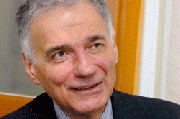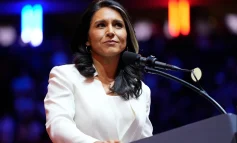In last week’s issue of The Arab American News, we took a fair look at Sens. Barack Obama and John McCain, detailing where they stand on several issues, as the two major presidential candidates that voters have to choose from. This week, we explore other options.
In most states, the ballots for the Nov. 4 election will list the names of six, not two, US presidential candidates.
You don’t hear about the other four very much, but they’re there.
And they’re angry.
They’re angry that major candidates ignore many pressing issues, that they’re ignored in the mainstream media and that they’re left out of the debates, because of a system dominated by the Democratic and Republican parties.
They feel the stranglehold that the two big parties have on the process gives them the power to ignore pressing issues and bend to the influence of interest groups.
Independent candidate Ralph Nader mocks what he calls empty, repetitive messages of hope and change coming from both major campaigns.
He said the difference between the two parties is narrowing, as the influence of big business deepens its effect on both.
“The difference is the velocity with which their knees hit the floor under corporate pressure,” he said.
Without a third party candidate participating, Nader said, debates between Republican and Democratic nominees are no more than boring, parallel interviews, both candidates ignoring and sidestepping the most important issues.
In addition to bringing light to neglected issues, the third-party candidates hope to gain 5 percent of the vote, which would guarantee federal campaign money for their party in the next presidential election.
Green Party nominee Cynthia McKinney has no illusions about her chances of actually winning the election, but said that votes based on principle rather than practicality can have a real impact.
“You don’t capitulate your values before you even vote… We have seen success when people vote their values,” she said. “This is a five percent campaign. Victory is five percent. That’s not a wasted vote.”
While in direct opposition to the major candidates on most issues, all four alternative candidates tend to agree with each other on foreign policy.
On economics and other issues, Nader and McKinney are liberal while Libertarian Bob Barr and Constitution Party nominee Chuck Baldwin are more conservative.
Here is a breakdown on the stances of the four candidates who really are “mavericks.”
Bob Barr, Libertarian Party
Bob Barr

|
|
Bob Barr |
The Libertarian party stands for decreasing government intervention in people’s lives, from taxes to foreign policy to social behavior. Barr has criticized the major-party nominees for supporting the Wall Street bailout, saying markets should be left alone.
He once championed the war on drugs and voted to authorize the war in Iraq, but now opposes them both.
Barr believes that the only legitimate economic functions of government are to “protect property rights, adjudicate disputes, and provide a legal framework in which voluntary trade is protected.”
“The government should stop attempting to ‘manage’ the free market,” he said.
He has similar hands-off views on foreign policy.
“America should not be the world’s policeman. The American purpose is to provide a strong national defense, not to engage in nation building or to launch foreign crusades… Moreover, foreign aid has proved to be a drain on the U.S. economy while doing little good for the recipients. Aid is routinely used by corrupt foreign governments to oppress their people and enrich powerful elites. Foreign aid almost always discourages economic and political reform, while subsidizing nations which often work against U.S. interests…
The most effective way to preserve peace is through an expanding free market, backed by a full range of cultural and other private relationships.”
Barr opposes government health care programs and believes deregulating the health care industry would make insurance more affordable.
“Regulations which mandate insurance coverage and inflate premiums should be eliminated. Controls which unduly restrict competition within the health care industry, and that limit access to insurance across state lines, should be ended,” he said.
He has spoken out against giving up civil liberties in the name of national security.
“The attacks of 9/11 leave us with great responsibility for the future. We must defend Americans from those outside who threaten violence. We also must defend Americans from those at home who would sacrifice our liberties.
Barr opposes both the regulation and the subsidization of energy companies and favors increased domestic oil drilling.
“The federal government should eliminate restrictions that inhibit energy production, as well as all special privileges for the production of politically-favored fuels, such as ethanol.
In particular, Congress should allow the exploration and production of America’s abundant domestic resources, including oil in the Outer Continental Shelf and Arctic National Wildlife Refuge, and alternative sources such as shale oil. We should develop our nation’s natural assets, which would lower costs to the consumer and assure more adequate and consistent supplies.
On education, Barr favors encouraging privatization, abolishing the Department of Education and eliminating federal grants and regulations.
“States should consider tax credits or deductions for parents who home school or send their children to private schools. The free market naturally provides both choice and competition, providing goods and services of higher quality for less expense.”
He believes in cutting off all government services to illegal immigrants, including education.
“A 1982 Supreme Court decision mandates that we provide education to the children of illegal immigrants. This detrimental ruling should be overturned through another Court challenge or a constitutional amendment… We also must transform our immigration bureaucracy and process that both impede legal immigration and encourage illegal immigration. We need to sharply increase the number of economically productive people allowed to enter the U.S. Americans benefit greatly from such immigration. The best policy would be to stop illegal immigrant flows while accepting more of the world’s economically productive.
On abortion rights, Barr is personally pro-life, but believes the issue should be determined by state, not federal law.
Chuck Baldwin, Constitution Party

|
|
Chuck Baldwin |
A conservative former Republican who believes the GOP has become too liberal, Baldwin’s platform includes drastically reducing the size and scope of government, making abortion illegal, clamping down on illegal immigration and allowing states to secede from the union.
He has been endorsed by Republican Rep. Ron Paul of Texas.
In the spirit of “reducing financial burden on American taxpayers” and adhering strictly to Constitutional limits of government, Baldwin opposes all financial bailouts and is in favor of ending all U.S. wars, foreign intervention and foreign aid.
“The best thing the United States can do to help is to stay out of the business of other countries and let them take care of their individual sovereign affairs,” he’s said.
Baldwin has said he would eliminate the Departments of Education, Commerce, Energy and the Food and Drug Administration.
He also opposes any government involvement in health care.
“Access to medical care should not be mediated by the federal government. The federal government has no Constitutional provision to regulate or restrict the freedom of the people to have access to medical care, supplies or treatments,” he said.
He takes a hard line on immigration:
“I would immediately secure our borders, with a fence and more border patrol agents or by utilizing the U.S. Army. There would be no ‘path to citizenship’ given to any illegal alien, no amnesty in any shape, manner, or form. I would not allow tax dollars to be used to pay for illegal aliens’ education, social services, or medical care. As President, I would end birthright citizenship for illegal aliens. There would be no ‘anchor babies’ during my administration.”
Cynthia McKinney, Green Party

|
|
Cynthia McKinney |
McKinney criticizes the major candidates for ignoring issues like civil rights infringements, due process violations, police profiling and brutality, human rights violations at home and abroad and destructive foreign policy.
Her involvement in political movements began as a child, when she was exposed to the civil rights movement in Georgia through her father, Billy McKinney, who was arrested in 1946 after returning from service in World War II and drinking from a water fountain designated for whites. Her father became an activist who took Cynthia along to demonstrations challenging racially discriminatory policies of the Atlanta Police Department, and to other protests across the south. Billy McKinney became a Georgia State Representative and Cynthia McKinney would follow in his footsteps in 1988, joining the state legislature, and immediately challenging a House rule requiring women to wear dresses by wearing slacks.
Now, as a presidential candidate, McKinney advocates closing all tax loopholes, repealing the Bush tax cuts for the top 1 percent of earners, “fairly taxing corporations, denying federal subsidies to those who relocate jobs overseas, repealing NAFTA.”
McKinney proposes dramatic change in U.S. foreign policy in the Middle East.
“Every day the U.S. tries to meddle in the Middle East is a day that things get worse,” she’s said.
She would limit foreign aid to “funding programs that truly change the lives of the poor, and help economies by healing ecosystems,” including programs based strictly on nonviolence.
“Policy focused on Israel and Palestine should be directed towards nonviolence.”
McKinney is known for having faced intense backlash from lobbying groups as a result of speaking out in favor of Palestinian rights while serving as a congresswoman.
Finance efforts of pro-Israel lobby groups resulted in her defeat in the 2003 race for her seat, which she had held since 1993. She was elected again in 2005 and defeated a second time in 2007.
McKinney supports single-payer, universal health care.
“I support a universal, single-payer “Medicare for all” health-care system in the United States. Even though we spend more than twice as much per capita on health care than most industrialized nations, we are 37th in the world in health care, 18,000 Americans die every year from lack of access to health care, and about half of all bankruptcies are partly due to medical costs,” she said.
On energy, McKinney’s plan is to “leave the oil in the soil, with the goal to be carbon-free and nuclear-free. This is not only necessary for life on the planet. It is also essential for economic recovery and health. The promotion of solar, wind, biomass and geothermal energy will create hundreds of thousands of new manufacturing, construction and service jobs, sited in under-served communities.”
She opposes the U.S.-Mexican border wall, which she says serves to funnel immigrants through rough terrain. She supports immigration policy that “promotes fairness, non-discrimination and family reunification,” and wants to provide immigrant workers with state and federal wage, tax and labor laws, worker’s compensation, disability and unemployment insurance benefits, medical care, education, housing and other services.
“We have to look at international economies, labor, diplomacy and military policy in conjunction with the tremendous urges that people have to leave their country to escape oppressed conditions created often by the U.S.,” she said.
She supports full reproductive rights for women.
“I have a track record that people can know about,” McKinney told The Arab American News in May. “Me, seeking truth, speaking out and having been punished for doing so… The political party that has become my home is one that has always stood for peace, justice and truth,” she said.
Ralph Nader, Independent

|
|
Ralph Nader |
Nader ran as the Green Party candidate in 2000, and as an independent candidate in 2004.
Nader fiercely criticizes both major parties as too beholden to corporate interests.
He pushes for greater regulation of Wall Street and the creation of single-payer national health insurance.
With the belief that unfair legislation has caused the middle class to suffer while the rich entrench their status, Nader pushes to “enact a living $10 wage, adopt a fair tax, and provide equal pay for women. We must
end corporate subsidies and bailouts, repeal NAFTA and the anti-union Taft/Hartley Law.”
Nader believes a private delivery, single-payer public health insurance system would “save $350 billion annually by eliminating exorbitant executive pay, advertising, computerized billing fraud and abuse.”
On the financial crisis, Nader supports a policy of “no bailouts without conditions and reciprocity in the form of stock warrants,” and “no bailouts without public hearings.”
He opposes “a strategy of pre-emptive war in the Middle East,” and has proposed a six month negotiated withdrawal from Iraq.
“We have to give the Iraqis their country back. We have to give the Iraqis their oil back. That will knock the bottom out of the insurgency,” Nader said at a Detroit rally in September. “I know a lot about this area. My parents came from Lebanon. I speak Arabic.”
He considers the Israeli-Palestinian conflict a humanitarian crisis, and said he “sides with the strong and courageous Israeli/Palestinian peace movements who are working for a peaceful two-state solution.”
“The Israeli people want peace. The Palestinian people want peace. And of course, the majority of the American Jewish community want peace,” he said. “The best way to keep Americans safe at home and abroad is to work on repairing our tarnished international image. We would do this by halting our unilateral, interventionist actions, and working with the global community toward common goals on things like climate change, instead of being adversarial… People who feel as if they are treated justly are unlikely to harm others… We need to realize that we all share one world. We’re in this together.”
On energy, Nader urges a new, “clean” policy that “no longer subsidizes entrenched oil, nuclear, electric and coal mining interests, an energy policy that is efficient, sustainable and environmentally friendly.”
He advocates increased “civic education” and decreased standardized testing.”
Nader wants a repeal of the No Child Left Behind Act. He opposes tying test performance to school funding and supports providing full funding for pre-school and nutrition programs.
He believes illegal immigration is caused by the inability of people to continue to live decently in their home countries.
He encourages enforcing existing laws against employers.
“It is hard to blame desperately poor people who want to feed their families and are willing to work hard to do so,” he said. “Enforcement is nearly non-existent – it has become a conscious policy to ignore both the labor and immigration laws by successive Republican and Democratic administrations, including not enforcing laws against cruel sweatshops in the United States. Such is the power of employers. Immigrant workers, even if undocumented, should be given the fair-labor standards, rights, and protections of American workers although here illegally. No humane alternatives exist, only exploitation, poverty, and disease.”
Nader is in favor of abortion rights.
“Reproductive rights are issues of life and death for women, not mere matters of choice,” he said. “We support the NOW platform: access to safe and legal abortion, to effective birth control, to reproductive health and education.”
Nader was once named by Time Magazine one of the “100 Most Influential Americans in the 20th Century.”
Over four decades of public service, he helped establish the Occupational Safety and Health Administration, the Environmental Protection Agency, the Consumer Product Safety Commission, the Safe Drinking Water Act, the Motor Vehicle Safety Act, and the Freedom of Information Act.






Leave a Reply